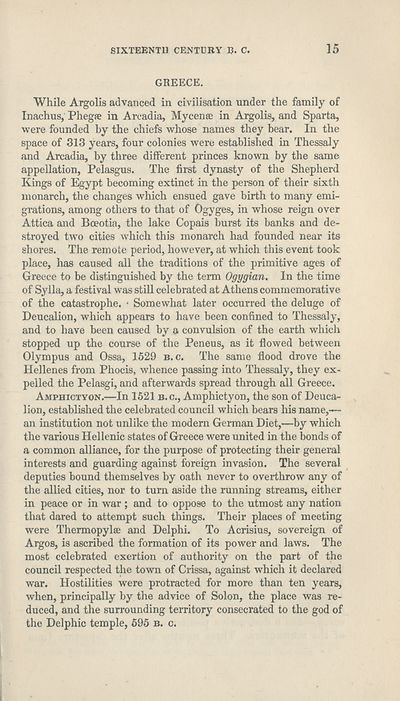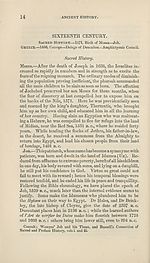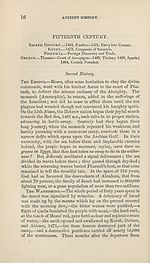Download files
Complete book:
Individual page:
Thumbnail gallery: Grid view | List view

SIXTEENTH CENTURY B. C.
15
GREECE.
While Argolis advanced in civilisation under the family of
Inachus, Phegse in Arcadia, Mycenae in Argolis, and Sparta,
were founded by the chiefs whose names they bear. In the
space of 313 years, four colonies were established in Thessaly
and Arcadia, by three different princes known by the same
appellation, Pelasgus. The first dynasty of the Shepherd
Kings of Egypt becoming extinct in the person of their sixth
monarch, the changes which ensued gave birth to many emi¬
grations, among others to that of Ogyges, in whose reign over
Attica and Boeotia, the lake Copais burst its banks and de¬
stroyed two cities which this monarch had founded near its
shores. The remote period, however, at which this event took
place, has caused all the traditions of the primitive ages of
Greece to be distinguished by the term Ogygian. In the time
of Sylla, a festival was still celebrated at Athens commemorative
of the catastrophe. ■ Somewhat later occurred the deluge of
Deucalion, which appears to have been confined to Thessaly,
and to have been caused by a convulsion of the earth which
stopped up the course of the Peneus, as it flowed between
Olympus and Ossa, 1529 b.c. The same flood drove the
Hellenes from Phocis, whence passing into Thessaly, they ex¬
pelled the Pelasgi, and afterwards spread through all Greece.
Amphictyon.—In 1521 b.c., Amphictyon, the son of Deuca¬
lion, established the celebrated council which bears his name,—
an institution not unlike the modern German Diet,—by which
the various Hellenic states of Greece were united in the bonds of
a common alliance, for the purpose of protecting their general
interests and guarding against foreign invasion. The several
deputies bound themselves by oath never to overthrow any of
the allied cities, nor to turn aside the running streams, either
in peace or in war ; and to oppose to the utmost any nation
that dared to attempt such things. Their places of meeting
were Thermopylae and Delphi. To Acrisius, sovereign of
Argos, is ascribed the formation of its power and laws. The
most celebrated exertion of authority on the part of the
council respected the town of Crissa, against which it declared
war. Hostilities were protracted for more than ten years,
when, principally by the advice of Solon, the place was re¬
duced, and the surrounding territory consecrated to the god of
the Delphic temple, 695 b. c.
15
GREECE.
While Argolis advanced in civilisation under the family of
Inachus, Phegse in Arcadia, Mycenae in Argolis, and Sparta,
were founded by the chiefs whose names they bear. In the
space of 313 years, four colonies were established in Thessaly
and Arcadia, by three different princes known by the same
appellation, Pelasgus. The first dynasty of the Shepherd
Kings of Egypt becoming extinct in the person of their sixth
monarch, the changes which ensued gave birth to many emi¬
grations, among others to that of Ogyges, in whose reign over
Attica and Boeotia, the lake Copais burst its banks and de¬
stroyed two cities which this monarch had founded near its
shores. The remote period, however, at which this event took
place, has caused all the traditions of the primitive ages of
Greece to be distinguished by the term Ogygian. In the time
of Sylla, a festival was still celebrated at Athens commemorative
of the catastrophe. ■ Somewhat later occurred the deluge of
Deucalion, which appears to have been confined to Thessaly,
and to have been caused by a convulsion of the earth which
stopped up the course of the Peneus, as it flowed between
Olympus and Ossa, 1529 b.c. The same flood drove the
Hellenes from Phocis, whence passing into Thessaly, they ex¬
pelled the Pelasgi, and afterwards spread through all Greece.
Amphictyon.—In 1521 b.c., Amphictyon, the son of Deuca¬
lion, established the celebrated council which bears his name,—
an institution not unlike the modern German Diet,—by which
the various Hellenic states of Greece were united in the bonds of
a common alliance, for the purpose of protecting their general
interests and guarding against foreign invasion. The several
deputies bound themselves by oath never to overthrow any of
the allied cities, nor to turn aside the running streams, either
in peace or in war ; and to oppose to the utmost any nation
that dared to attempt such things. Their places of meeting
were Thermopylae and Delphi. To Acrisius, sovereign of
Argos, is ascribed the formation of its power and laws. The
most celebrated exertion of authority on the part of the
council respected the town of Crissa, against which it declared
war. Hostilities were protracted for more than ten years,
when, principally by the advice of Solon, the place was re¬
duced, and the surrounding territory consecrated to the god of
the Delphic temple, 695 b. c.
Set display mode to:
![]() Universal Viewer |
Universal Viewer | ![]() Mirador |
Large image | Transcription
Mirador |
Large image | Transcription
| Antiquarian books of Scotland > Education > Elements of universal history on a new and systematic plan > (35) |
|---|
| Permanent URL | https://digital.nls.uk/127580560 |
|---|
| Description | Thousands of printed books from the Antiquarian Books of Scotland collection which dates from 1641 to the 1980s. The collection consists of 14,800 books which were published in Scotland or have a Scottish connection, e.g. through the author, printer or owner. Subjects covered include sport, education, diseases, adventure, occupations, Jacobites, politics and religion. Among the 29 languages represented are English, Gaelic, Italian, French, Russian and Swedish. |
|---|

